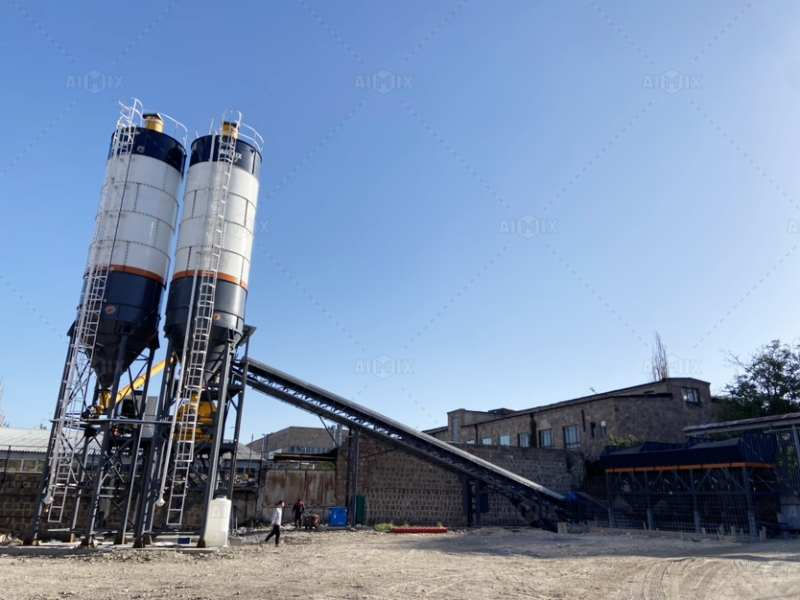Exploring the Future of Ready Mix Concrete Batching Plants in the Construction Industry
- aimixglobal5
- Jan 8, 2025
- 4 min read
The construction industry is evolving rapidly, with new technologies and practices reshaping the way projects are executed. One area experiencing significant transformation is the use of ready mix concrete batching plants. These facilities, which produce high-quality concrete tailored to specific project needs, are becoming increasingly indispensable as the demand for efficiency, sustainability, and innovation grows. In this article, we’ll explore the future of ready mix concrete batching plants, examining emerging trends, technological advancements, and their impact on the construction industry.

1. The Growing Importance of Ready-Mix Concrete Batching Plants
Ready mix concrete batching plants are critical to modern construction, offering several benefits over traditional on-site mixing methods:
Consistency and Quality: These plants produce concrete with precise proportions of raw materials, ensuring uniformity across projects.
Efficiency: Automated processes reduce manual labor and production time.
Cost-Effectiveness: Bulk production of concrete lowers material and operational costs.
The increasing adoption of ready mix concrete batching plants is driven by the construction industry’s push toward improved project timelines and stricter quality standards.
2. Emerging Trends Shaping the Future
a. Automation and Digitalization
Advanced automation systems are transforming batching plants into smart facilities. Key features include:
Automated Mixing Systems: These systems optimize the mixing process, ensuring accuracy and reducing waste.
IoT Integration: Internet of Things (IoT) technology enables real-time monitoring of plant operations, improving efficiency and troubleshooting.
AI and Machine Learning: Predictive algorithms enhance maintenance schedules, reducing downtime and extending equipment lifespan.
These advancements improve productivity while reducing operational costs, making automation a cornerstone of future-ready batching plants.
b. Mobile and Modular Plants
The demand for mobility and flexibility has led to the rise of mobile and modular ready mix concrete batching plants.
Portable Solutions: Mobile mixing plants cater to remote projects or areas with limited infrastructure, reducing transportation costs.
Scalable Designs: Modular systems allow plants to be expanded or reconfigured based on project needs.
This adaptability makes mobile and modular batching plants ideal for dynamic construction environments.
c. Sustainability and Green Practices
Sustainability is a growing focus in the construction industry, and batching plants are no exception.
Recycled Materials: Plants are increasingly using recycled aggregates and fly ash to reduce reliance on virgin resources.
Energy Efficiency: Innovations such as solar-powered operations and energy-efficient machinery are reducing the carbon footprint of batching plants.
Waste Management: Advanced systems minimize waste by optimizing material usage and recycling wastewater.
These eco-friendly practices align with global efforts to promote sustainable construction.

3. Technological Advancements Driving Innovation
a. Advanced Control Systems
State-of-the-art control systems are revolutionizing the management of batching plants. These systems allow operators to:
Monitor production metrics in real-time.
Adjust mix proportions to meet specific project requirements.
Detect and address operational issues promptly.
Such advancements ensure consistent production quality and reduce downtime, enhancing overall plant efficiency.
b. Integration of Smart Sensors
Smart sensors play a pivotal role in modern batching plants by providing accurate data on:
Raw material levels.
Moisture content in aggregates.
Concrete temperature and consistency.
This data enables precise adjustments to the mixing process, ensuring optimal performance and quality.
c. Robotics and Automated Maintenance
Robotics is making maintenance tasks more efficient and less labor-intensive. Automated systems handle routine inspections and minor repairs, reducing the risk of human error and prolonging equipment life.
4. The Impact on the Construction Industry
The advancements in ready mix concrete batching plants are significantly impacting the construction sector:
Faster Project Completion: High-efficiency plants reduce production times, enabling faster delivery of concrete to job sites.
Enhanced Quality Standards: Consistent concrete production meets stringent quality and safety regulations.
Cost Savings: Streamlined processes and reduced material wastage lower overall project costs.
Sustainability Goals: Eco-friendly practices align with the industry’s shift toward green construction.
These benefits make batching plants an essential component of future construction projects.
5. Challenges and Opportunities
While the future of ready mix concrete batching plants is promising, challenges remain:
Initial Investment Costs: Advanced plants require significant upfront investment, which may deter small contractors.
Skilled Workforce: Operating automated systems demands technical expertise, necessitating workforce training.
Regulatory Compliance: Adhering to environmental and safety regulations can be complex and costly.
However, these challenges present opportunities for innovation, training programs, and collaboration with industry stakeholders to overcome barriers and drive adoption.

6. The Role of Leading Manufacturers
Manufacturers play a critical role in shaping the future of batching plants. Companies like Aimix, Liebherr, and Schwing Stetter are:
Developing cutting-edge technologies to improve plant performance.
Offering tailored solutions to meet diverse project needs.
Providing comprehensive after-sales support, including training and maintenance services.
Their contributions ensure that ready mix concrete batching plants remain at the forefront of the construction industry.
7. Preparing for the Future
To capitalize on the evolving landscape of batching plants, businesses should:
Invest in Modern Equipment: Upgrade to advanced plants with automation and eco-friendly features.
Train the Workforce: Equip employees with the skills needed to operate and maintain new systems.
Collaborate with Experts: Partner with reputable manufacturers for guidance and support.
By staying ahead of trends, companies can enhance their competitiveness and contribute to the industry’s growth.
Conclusion
The future of ready mix concrete batching plants lies in innovation, sustainability, and adaptability. With advancements in automation, mobile designs, and eco-friendly practices, these plants are poised to revolutionize the construction industry. By embracing these trends and addressing challenges, businesses can maximize the benefits of modern batching plants, ensuring long-term success in an ever-changing market.
Whether you’re a contractor, supplier, or investor, now is the time to explore the potential of ready-mix concrete batching plants and align with the future of construction.




Comments